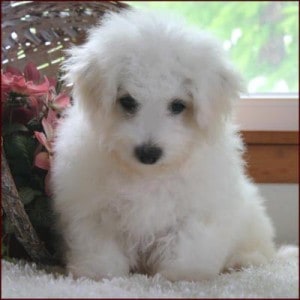From the desk of Sharda Baker.
8/12/2014
Hi and welcome everyone!
This is Sharda with another Bichon Frise newsletter!
Today, let’s discuss about your Bichon Frise hygiene!
The Bichon Frise dog breed may be considered as one of the top choices when it comes to family pets or show dogs.
Though not an unhealthy breed, there are still some health conditions that owners have to be aware of to provide better care for their Bichons.
So, today let’s look at some of the things that we have to understand and consider to help our Bichon Frise become healthy and happy.
Common Bichon Frise health concerns pertain to allergies and infections.
Skin conditions such as atopy and flea allergy are more often than not observed in most Bichon Frises.
Your Bichon Frise also has extra sensitive skin, which is why when you see your pet scratching from time to time, this may mean that you immediately have to have him checked by the vet.
Preventing possible mite or flea infestation is also important, and this can be done by spraying your Bichon Frise with vet recommended solutions.
Aside from the flea, other factors may cause your Bichon Frise to have allergies.
Food such as raisins, chocolates, onions, and the likes, as well as pollen, dust, and inhalants like insect sprays, air fresheners, etc. may be the culprits as to why your pet has lost the vitality it used to have.
Sometimes, a strong shampoo may cause your dog to itch. Some Bichons also get irritated by tobacco smoke.
If you are really concerned about Bichon Frise health, act immediately and have your dog treated.
Below are some tips on how you can lessen allergen triggers and keep your Bichon Frise healthier:
- Bathe your pet on a monthly basis and do not forget to rinse any shampoo residue thoroughly.
- If your house has carpets, make sure to vacuum them habitually.
- Dust your whole house at least once a week.
- Ensure that your Bichon Frise eats dog food of good quality, with ingredients that your dog is not allergic to.
- During seasons like Fall or Summer, keep your windows closed to help prevent pollen or dust from entering your home and triggering allergies in your Bichon Frise.
Bichon Frise health tips also reiterate proper dental hygiene as it is also important to your Bichon Frise.Without good dental care, you might find your dog the victim of tooth disease or tooth loss.
Avoid feeding your Bichon with canned food and make certain that his teeth are brushed to avoid any tooth problems.
Kidney stones and bladder infection are also common to most Bichon Frises. For better Bichon Frise health, always let your pet drink clean water.
Check your Bichon’s urine, too, and if you notice hints of blood on it, have him treated as soon as possible by the vet.
Just like most dogs, Bichon Frises are also not exempted from having cancer.
Male Bichon Frises usually develop prostate cancer while female Bichon Frises more often than not develop mammary gland carcinoma.
To extend your Bichon’s life in case he develops these forms of cancer, spaying and neutering may become necessary.
Take note that the Bichon Frise health problems mentioned above do not really happen as often as you might think, thus, Bichons remain as pet favourites.
By caring for your Bichon properly and seeing to it that your pet is kept healthy, you can expect him to remain with you for around ten to fifteen years.
To start caring for your Bichon Frise in a more excellent manner, it is best to search for a good book on Bichon Frise health, start reading then apply whatever you have learned!
I hope you learned a lot from this Bichon Frise newsletter.
All the best and take care
Warmly,
Sharda Baker

